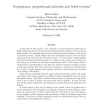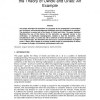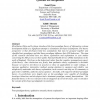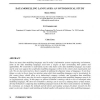ICMAS
2000
14 years 1 months ago
2000
In this paper, I motivate, define, and illustrate the notion of computationally grounded theories of agency. A theory of agency is said to be computationally grounded if we can gi...
AIML
1998
14 years 1 months ago
1998
In this paper I will propose a new approach to certain semantic puzzles due to Frege, Kripke and others, and the question of propositional attitudes, via the notion of belief revi...
IWFM
2003
14 years 1 months ago
2003
This paper describes the derivation of a program for the propagation of information over a network, with acknowledgement (feedback) when the computation is complete. The derivatio...
EUSFLAT
2003
14 years 1 months ago
2003
In 1931 and 1935, Ernst Adolph Guillemin, professor of electrical engineering at Masachusetts Institute of Technology (MIT), published the two volumes of his book “Communication...
ECIS
2003
14 years 1 months ago
2003
Hirschheim, Klein and Lyytinen introduced the four-paradigm theory of information systems development (ISD) as a significant attempt to systematise developer assumptions. The theo...
ECIS
2001
14 years 1 months ago
2001
There are many data modelling languages used in today's information systems engineering environment. Some of the data modelling languages used have a degree of hype surroundi...
ECIS
2004
14 years 1 months ago
2004
The Internet has changed the way many software developing companies have to work
FOIS
2010
14 years 1 months ago
2010
Abstract. Taking for granted an ontological standpoint independent of any empirical or epistemological perspective, philosophical theories of properties are actually quite rarely a...
AGI
2008
14 years 1 months ago
2008
Every agent aspiring to human level intelligence, every AGI agent, must be capable of a theory of mind. That is, it must be able to attribute mental states, including intentions, t...
GECCO
2006
Springer
14 years 4 months ago
2006
Springer
Two mathematical and two computational theories from the field of human and animal learning are combined to produce a more general theory of adaptive behavior. The cornerstone of ...






